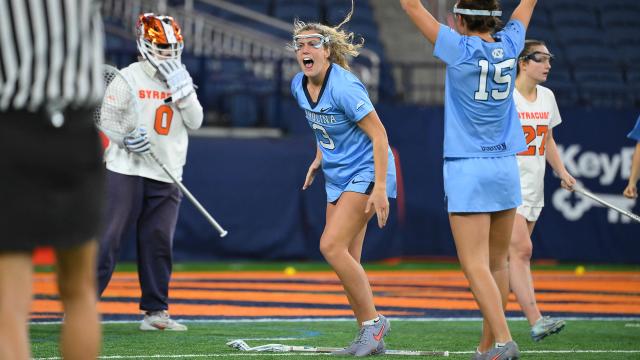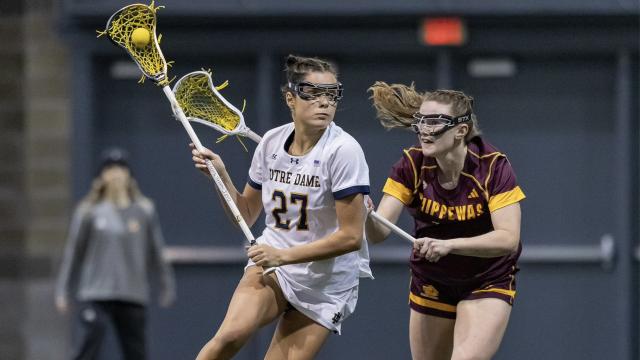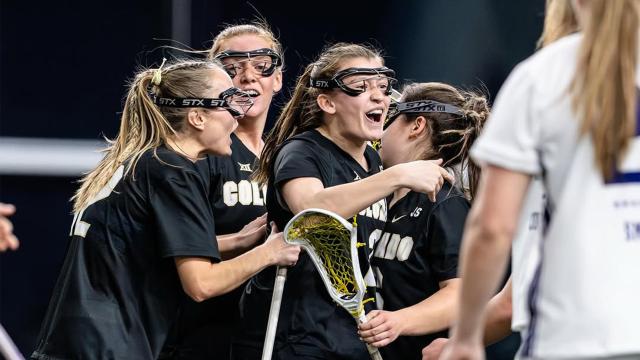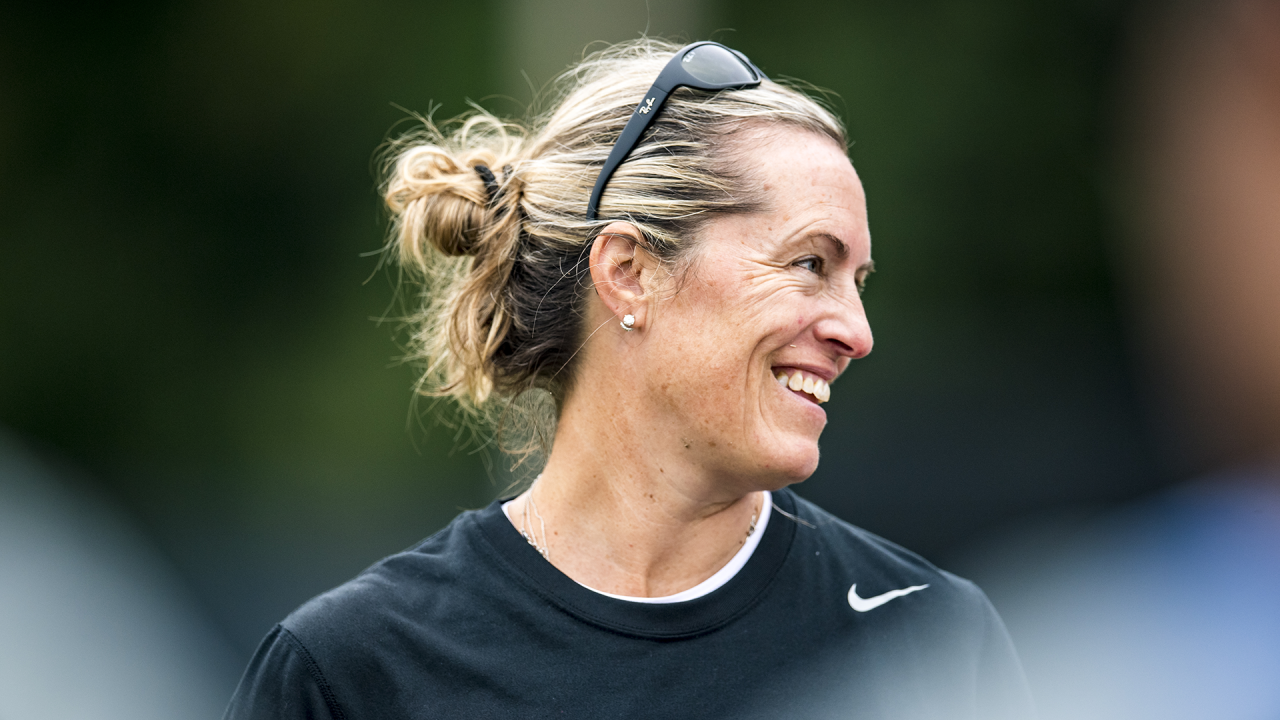
The Giving Tree: Kerstin Kimel ‘Mom and Mentor’ to Coaches with Cancer
Coaching trees are a fun topic of conversation in sports. The Bill Parcells one in football includes Bill Belichick. Cindy Timchal’s coaching tree is the giant sequoia of women’s lacrosse.
Duke head coach Kerstin Kimel has her own tree, one no one wants to be on. It involves coaching with cancer.
Ten years after her diagnosis, she’s rooted in hope and a desire to help others find healing.
I knew I wasn't the first, and I wasn't going to be the last.
When Wesleyan head coach Kim Williams was diagnosed with breast cancer in late 2019, she spoke with IWLCA president Liz Robertshaw. The former Boston University head coach and U.S. Women’s National Team assistant quickly suggested Wiliams talk to Kimel.
“She was someone who had been through it, and [Liz] said she could help give you a lot of support,” Williams said.
Kimel was diagnosed with breast cancer in January 2015 and underwent treatment that season. Williams was staring down a similar path when she took Robertshaw’s advice and called Kimel in February 2020. In the decade since her diagnosis, Kimel’s story and willingness to help has become so prolific in lacrosse circles that coaches with more recent diagnoses haven’t necessarily needed a suggestion from Robertshaw (or anyone).
“Honestly, she was my first call outside of my family,” said High Point head coach Lyndsey Boswell, who underwent treatment for ovarian cancer last year. “No one in the lacrosse world knew — not even my team. I called her on a whim, feeling a little desperate going into my season and uncertain whether I should tell people.”
Kimel’s advice to Boswell was the same as she shares with everyone who calls her: Let people lift you up. It was advice Kimel desperately needed to hear and accept 10 years ago and fuels her to answer the calls, texts and emails she gets from women today.
“As a coach, your job is to serve others, and you always put other people's needs first,” Kimel said. “It was hard for me, at the time, to be in a position where others are taking care of me. [Since then], I’ve just felt incredibly moved to help, to talk about it.
“I knew I wasn’t going to be the first, and I wasn’t going to be the last.”
Indeed, the American Cancer Society estimates about 1 in 8 women will be diagnosed with breast cancer in their lifetime. The 1’s — and other people who simply wanted to help whether they had undergone cancer treatment or not — quickly began reaching out to Kimel as word spread in 2015.
Maria Slusser, mother of former Duke defender Anne Slusser, wrote her a long letter of do’s and don’ts, as in, “Don’t read your oncology report.”
Dona Rodgers, mother of the late Morgan Rodgers, also provided support.
Samantha Ekstrand, Kimel’s former assistant coach at Duke and general counsel for the IWLCA, wanted to be her point person.
“Sam knew people were going to want to help and was like, ‘Let me help you not be overwhelmed by it. You’re in season,’” Kimel said. “She ended up creating a fund that people could donate to and used that fund to feed my family, get my house cleaned and do whatever was needed during that window of time.”
It let the lacrosse community — especially those outside of Durham — rally around Kimel without her having to intercept every call. And it’s something she’s strived to replicate for the other women who have called her since. She linked Boswell with an organization called the Food Fairies, which included weekly visits from a personal chef to make nourishing meals for her family.
“I emailed Kerstin, and she called me just a few hours later,” Boswell said. “By the time she called me, she already had three or four resources that I should jump on right away. She's someone that takes action.”
Added Clemson head coach Allison Kwolek: “Other than my immediate family and coaching staff, nobody knew when I texted her, ‘Hey, do you have time to catch up?’ I probably caught her off-guard by what I said [about my breast cancer diagnosis], but she immediately went into this combination of mom and mentor mode, telling me, ‘These are things to think about, and it’s going to be OK.’”
Kimel put Kwolek in touch with a nutritionist specializing in cancer treatment and helped her find a doctor.
For Williams, it was about validation — to let herself be cared for, look for ways to lower stress levels and continue to coach through treatment.
“So many people expect you not to work,” Williams said. “For us, being on the field with our team heals us and is an escape from the stressors of life and our health. It was so helpful to talk to someone who knew how much I wanted to get back on the field with my players.”
When the COVID-19 pandemic upended Williams’ treatment and ability to be with her team, she turned to Kimel for stress management advice.
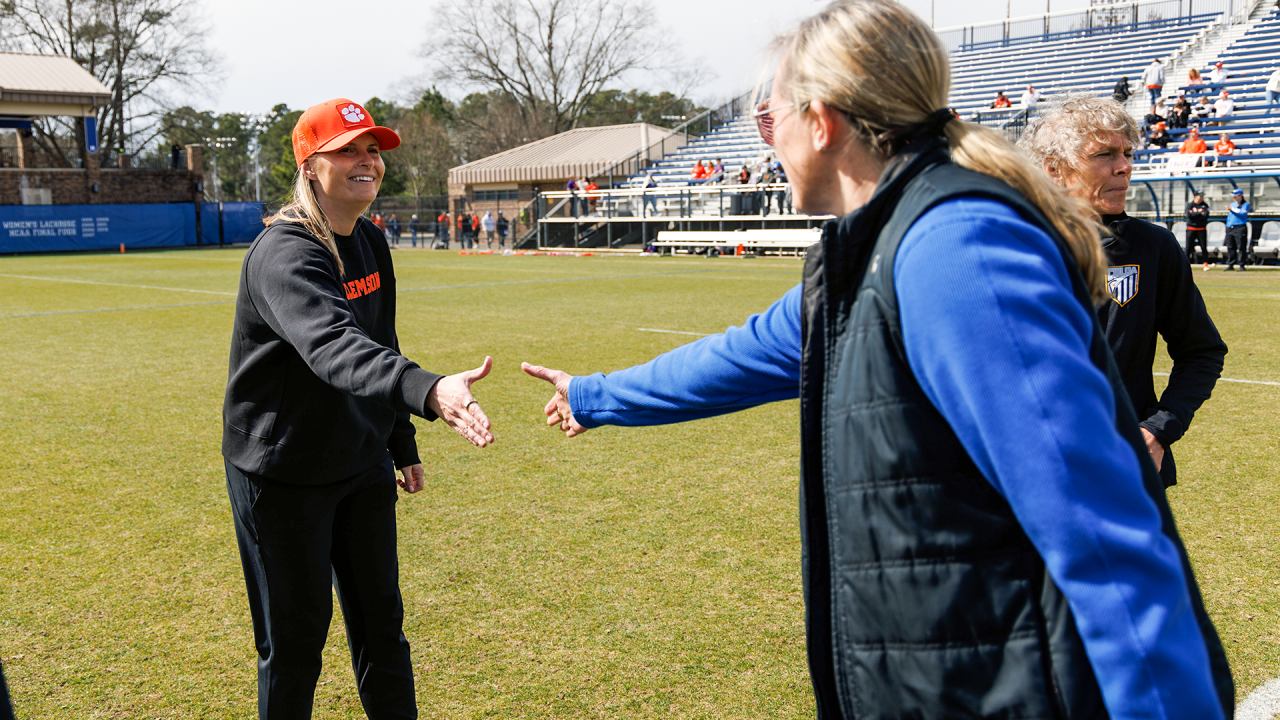
Kimel didn’t do it alone. From the outside, Duke’s run to the 2015 NCAA semifinals amid her cancer treatment reads like a fairytale and Marvel blockbuster in which Kimel stars as the superhero. But behind the curtain, she credits her players — especially the senior class — and assistant coaches. They acted as far more than an ensemble cast around her.
So Kimel didn’t hesitate to put Boswell and her staff in touch with her former assistants. Amanda Barnes Moore, now the head coach at Ohio State, spoke with the High Point staff about managing a season under such extenuating circumstances.
“I always tell people that 2015 was one of the hardest years of my life,” Kimel said. “At the same time, if you coach long enough, you know that seasons and teams like that don't come around every year. I look back on it, and yes, it was hard. But I also look back on it like, ‘Wow, that was a special year.’”
As with literal and figurative seasons — and lacrosse programs each year — everyone is different. Not every team is built to go to the final four (Duke hasn’t been back to championship weekend since) and not every woman will want to work through treatment (though not everyone has that option). Talk to enough people in the cancer community, and two themes around support can emerge: It’s vital because cancer is so lonely and disorienting. But sometimes, people can project their own journeys onto someone else, “should-ing” people with one-size-fits-all advice on treatment.
But therapies have evolved in the 10 years since Kimel’s diagnosis, and people have different values, finances and thresholds. Heck, Boswell had a different form of cancer altogether.
“I never, ever felt like it was her journey,” Boswell said, catching her voice before adding, “I felt like she was more or less a teammate of mine.”
Kimel’s words in huddles and speeches to peers have long made her a leader in the community. One of Williams’ first interactions with her was a talk Kimel gave with Julie Myers on leading through tragedies (Myers spoke of losing her player, Yeardley Love, to domestic violence, and Kimel talked about her health). She remembers their poignant words vividly. And yet, when Kimel speaks with people who call her about cancer treatment, she leads with her ears.
“The most important thing is you just have to listen,” Kimel said. “You have to feel out what this person is thinking and what support looks like to them.”
For this reason, Kimel also encourages people to educate themselves on their cancer and options — some of which weren’t available to her. Learning about new treatments is one way Kimel heals through hope and helping others — because while she has embraced her role as a mom-meets-mentor to women in the community, she admits learning of new diagnoses makes her “sick to her stomach.” But each advance can change the prognosis for generations of women.
“Having breast cancer 10 years ago is like having kids 10 years ago — everything changes,” Kimel said. “I love to hear where people are and what potential plans are. I look at someone like Lyndsey Boswell, who obviously didn’t have breast cancer but had a different treatment plan with immunotherapy that wasn’t really an option for me. There are also new treatments for people that may not involve them losing their hair, which, let’s be honest, is traumatic.”
While everyone’s mileage and plans vary, like a veteran teammate, Kimel can still anticipate questions and concerns and share a timeless perspective when she does feel it’s her turn to talk. Remember how Kimel struggled to put herself first and let others care for her during treatment? Boswell rattled off the same fears.
“How can I help my husband? What can I do for my children? What can I do for my staff?” Boswell remembers asking Kimel. “I wanted everything to be in place so that nothing caught them off guard so that I didn’t have to worry that they were going to be unprepared. In all honesty, some days, it was like I wasn’t even in my body. She just took the stress off and had me focusing on my health more than winning lacrosse games.”
Having breast cancer 10 years ago is like having kids 10 years ago — everything changes.
That perspective — that there are more important things than winning lacrosse games — isn’t a throwaway line from Boswell or Kimel. It’s a value Kimel lives, and it was on March 11, 2023, when Kimel and Kwolek found themselves on opposite sidelines in South Carolina.
Clemson, in its first year as a Division I program, upended the Blue Devils 11-10. The two shared a long embrace after the game that resembled a hug you might see between a mother and daughter or coach and former star player.
Except, Kwolek and Kimel were neither of these. Then, things came into perspective days later when Kwolek announced she had breast cancer. Soon after, she shared a familiar refrain: Kimel was one of her first calls. That game? It was the first time they had seen each other in person since Kwolek learned of her cancer.
“We’d been texting a lot. Before the game even started, we hugged, and I was crying,” Kwolek said. “At the end of the game, it was not so much the win or the loss but that I was early in my treatment with surgery still ahead. It put everything into perspective. There are more important things. The game is our job and a great thing we get to do, but making sure that our health is taken care of so that you can do things and be available to the people you love is the priority.”
Kimel has taken the reins of her health, paying more attention to the ingredients in care products since her diagnosis. And she continues to attend annual check-ups. Her five-year clean bill of health felt like a milestone — and it was. So many prognoses look at five-year survival rates. Her next check-up is this spring. Her chart will say it’s been 10 years, but sometimes, she checks her own notes.
“Coach K has always said, ‘A season is a lifetime,’” Kimel said. “When you look at it in terms of lacrosse years, there are days that it feels like so long ago. But there are days when it feels like it was yesterday.”
Still, walking into the building for her check-up is a sobering reminder — despite the Duke Cancer Center’s best efforts, which often include a live pianist.
“I loathe walking in there,” Kimel said. “It’s gotten easier every year, but [the fear of recurrence] is always there. It’s something you have to be able to manage mentally and emotionally, and it’s something you think about most days at some point. The only thing you can do is embrace it. It’s there. It’s part of who you are at this point in your life. I try to manage emotions around it and pray that I am in good hands.”
Kimel hopes the hope — mixed with a dose of practicality — is contagious.
“One of the most important things you can do when having these conversations with people is to give them hope and motivate them that, ‘You can do this. It’s going to be hard, and it’s going to be a distraction. It’s going to be uncomfortable — physically and mentally and especially emotionally at times — but you can do this.’”
Kimel checked in with Boswell frequently, including Monday motivational texts.
“It was the consistency of it,” Boswell said. “When you're in something that hard and you have something like that to look forward to, it was the really small things that she did that were so powerful for me.”
Recently, it was Boswell who contacted Kimel with an update. She had just had a check-up. She was cancer-free.
“[Kerstin] was one of my first calls,” Boswell said. “She had been in my corner, waiting as I was waiting to hear the scan message. She got the news as soon as I got it — right there with my family.”
Beth Ann Mayer
Beth Ann Mayer is a Long Island-based writer. She joined USA Lacrosse in 2022 after freelancing for Inside Lacrosse for five years. She first began covering the game as a student at Syracuse. When she's not writing, you can find her wrangling her husband, two children and surplus of pets.
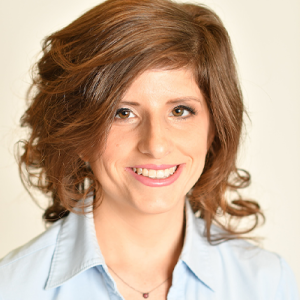
Related Articles
